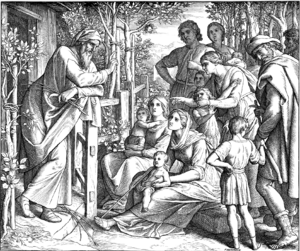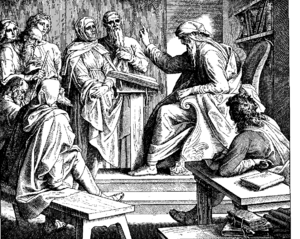Ben Sira facts for kids

Ben Sira, whose full name was Shimon ben Yeshua ben Eliezer ben Sira, was a wise Jewish writer and teacher. He lived in Jerusalem during the Second Temple period, when the Seleucid Empire ruled the area.
He is famous for writing a book called Sirach, which is also known as "Ecclesiasticus." He wrote this book in Hebrew, possibly around 180–175 BCE in Alexandria, Egypt. It is thought that he might have started a school there.
Ben Sira likely lived around the same time as High Priest Simon II (219–199 BCE). A later book, the Alphabet of Sirach, was wrongly said to be written by him.
Contents
About His Name
In the Greek version of the Book of Sirach, the author's father is called "Jesus, the son of Sirach of Jerusalem." The name "Jesus" is the English way of saying his Greek name, which came from the Hebrew name "Yeshua."
A well-known rabbi and philosopher from the 10th century, Saadia Gaon, had a copy of the text that read "Shimʽon, son of Yeshuaʽ, son of Elʽazar ben Siraʼ." Other old Hebrew writings show a similar name.
The name Sirach is the Greek way of saying his family name, Sira.
His Life
The Greek version of his book suggests that Ben Sira traveled a lot and faced many dangers. In a hymn within his book, he thanks God for saving him from various troubles. However, this might just be a poetic way of writing, similar to the Psalms.
One thing we know for sure from his writings is that Ben Sira was a very educated person. He was a scholar and a scribe, meaning he was skilled in writing and knew the Jewish Law very well. He was especially knowledgeable about "Books of Wisdom."
His Grandson
We don't know much about Ben Sira's grandson. He is the one who translated the book of Sirach from Hebrew into Greek. He probably did this many years after Ben Sira first wrote it.
The grandson's introduction in the Greek text is important. It is considered one of the earliest mentions of a collection of books from the prophets.
The grandson wrote that he arrived in Egypt in the thirty-eighth year of a ruler named Euergetes. This likely refers to Ptolemy VIII Physcon, who became king in 170 BCE. This means the translator probably came to Egypt in 132 BCE.
See also
- Wisdom literature
- Wisdom (personification)
 In Spanish: Jesús ben Sirá para niños
In Spanish: Jesús ben Sirá para niños
 | Isaac Myers |
 | D. Hamilton Jackson |
 | A. Philip Randolph |


